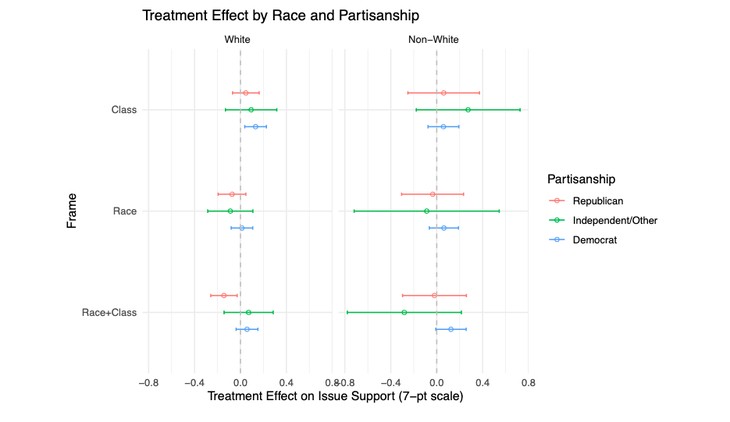A new study shows that when Democrats dive headfirst into policy messaging based on the “anti-racist” ideas of Ibram X. Kendi and Robin DiAngelo, their policies become less popular. While the Left is trying to tie this finding to white grievance and racism, the actual research doesn’t bear that out. As always, one of the hottest hot takes comes from Johnathan Chait at the New York Intelligencer. The subtext to his headline is “Guess why? because there are a lot of racists.”
That is not actually what the study demonstrates. Regardless of race, Republicans and Independents both dislike the equity messaging. They are more likely to respond positively to socioeconomic messaging, which the study characterizes as class. Of course, if any of them admitted that, they would have to give Donald Trump credit. He is an incredibly wealthy man who understands that several decades of a lax border enforcement, endless foreign wars, outsized foreign aid, and asymmetrical foreign trade made some in America very rich.
Recommended: Study: ‘White Privilege’ Lessons Make Liberals Less Empathetic to Poor Whites
However, Trump also knew that these policies made broad segments of the working and middle class less prosperous and secure. Understanding these trends made up the underlying themes of his 2016 campaign and almost every foreign and domestic policy of his administration. He never cared what color anyone was, and it wasn’t “white grievance” that got him elected. As Salena Zito and Brad Todd found in their book The Great Revolt, those left behind by the increasing globalization found that the policies of President Barack Obama, a man many of them voted for, did nothing to improve their situation and Trump’s messaging on the economy resonated with them.
In the study, two Yale political scientists used verbatim quotes from Democrat candidates using anti-racist messaging and then modified them to base the messaging on class, a combination of race and class, and on neutral language. Unfortunately, the study conflates the terms equality and equity, which have come to mean very different things in the current political moment. Americans are broadly supportive of policy aimed at equality, which denotes access and opportunity. Equity policies attempt to ensure equal outcomes, which generally involve massive wealth redistribution schemes. This divide is an ideological one, not a racial one.
Even the study’s authors had to admit that while Republican support for various policies declined based on anti-racist messaging, it did do so in a way that was statistically insignificant. And the study’s graphs demonstrate that the ideological divide is stronger than the racial divide. The study also shows that anti-racist messaging does not appeal to Republicans or Independents, no matter their race, at similar rates:

Additional information shared by Chait reinforces this view. The far-Left group Data for Progress found in a similar messaging study on housing policy, messaging framed around economic growth garnered more support than campaigns framed around racial justice. This is the same group that told Democrats a far-Left social justice agenda was wildly popular with voters ahead of 2020. The results on this question and Biden’s polling at the 100-day mark must be shocking to them.
When housing policy is framed in terms of economic opportunity, it garners the most significant support across political affiliation. When the same policy is stated in racial justice terms, support for it declines among all groups except Independent and third-party voters. Putting those two together with third parties like the Green Party and the Democratic Socialist Party seems like manipulation, but support falls the most among voters who identify as Democrats — at 7%.
Recommended: With Polling at 100 Days Will Joe Biden Finally Realize His Agenda Does Not Have a Mandate?
So, what does Chait take away from these two surveys?
What’s odd about this result is that it shouldn’t come as a surprise. Indeed, the conclusion that race-conscious messages backfire is a direct corollary of the premise that racism is a potent force in American life. Of course Republicans are going to try to convince voters that any Democratic proposal is mainly designed to help Black people. And of course those messages, sometimes subtle, will push white people away from the Democrats, even if those white people aren’t explicitly identifying as racists. Racism is a potent force in American life.
Insane. I wonder if Chait knows that the anti-racist curriculum is unpopular even among wealthy, urban, liberal parents. Some are too afraid to speak out, but more are doing so. Perhaps equity, anti-racist messaging doesn’t work because America internalized the ethos of Martin Luther King Jr.’s message almost 50 years ago, rejecting Malcolm X. Hopefully, this messaging will keep falling from the lips of President Joe Biden and every member of his administration—because it would seem most Americans prefer to continue to work to reduce discrimination rather than implement new discriminatory policies to address past discrimination.
Likewise, while some intelligent Republicans have figured out that their base is becoming more working and middle class, they need to stop merely saying that. They need to start talking about what those policies look like. Define energy independence, symmetrical global trade, national and domestic security, and school choice and education innovation. Then develop stories and emotional appeals to illustrate how they make the lives of working families better. That is the winning message for 2022.










Join the conversation as a VIP Member